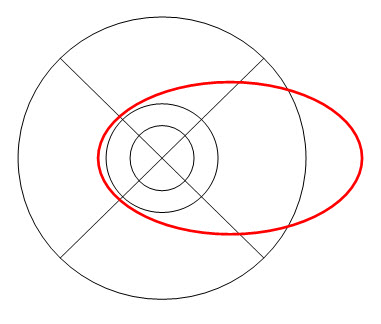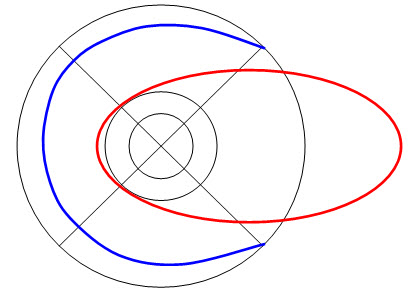So what, you might ask of the previous blog? Does the fact there are limits to achievement constrain emotional, intellectual or spiritual potential? In theory it does not. But there is a much more practical constraint on these: our own predispositions and abilities define the constraints of our own achievement in these areas. We can approach, and might even occasionally reach our potential in all three areas but we can do no more than that, for if we suggested otherwise we would simply have incorrectly defined our limits. As such in all three quadrants our achievement will be within the constraints of the outer circle that indicates the limits of our potential.
This though is not true of our potential to consume material goods. Here we do not know the limit of our own ability. We can waste that which should reasonably belong to others. We can consume that which should belong to generations that should follow us, knowingly or unknowingly. But however we look at it we can actually do this:

This is important. First, the fact that we can consume more than we should if we are to act either equitably or sustainably has consequences. We remain finite, even if we consume more than we should. That excess consumption does not create 26 hours in a day. It does not mean we can either receive more from or give more to our emotional relationships. In fact, the reverse is likely. The time spent consuming material goods does not just create waste in the sense that others are deprived of what is rightfully theirs: it denies us the chance to do all we might to achieve a balanced lifestyle. I propose something quite simple: to the extent that we over consume materially we constrain our ability to achieve in other aspects of our lives. The diagram looks like this:

The blue line (which should be smooth: forgive my electronic drawing ability) shows that the area of intellectual, purposeful and emotional achievement has been constrained by having sought to consume to over-capacity in the material area. And, the more we over consume the more the relative impact of that constraint is, I suggest. That is because of a simple rule that is well known to conventional economists, which is called the law of diminishing marginal returns. This is not a perfect rule: it is a model and like all models it has flaws, but within reason it holds true. It says that as one has more of something (anything, it does not matter what) the value you attribute to each additional unit of that thing you acquire falls.
Basic instinct says that this is usually true. Some would argue that cash avoids the rule because additional cash simply provides the ability to substitute between different forms of consumption. But I’m not even sure that is true: I have no doubt at all that an additional pound, euro or dollar is worth more to a person on low pay than to a person on high pay. If that is the case then relatively speaking as the excess consumption rises then the impact on emotional, intellectual and spiritual life increases until it is quite possible that it could induce a crisis in society, or in education and all through a lack of apparent meaning because consumption has become the god we worship. Does that sound familiar? The result is that over consumption gives rise to an increase in material will being and yet a loss in the overall sense of well being – call it happiness if you like. It is a phenomenon well known amongst those now observing developed economies.

Something’s gone wrong here.
In the previous posts you were advocating the view that human beings were fundamentally limited, and using the outer circle to represent that limitation.
Now you are busting out of that outer limit. But on your own terms, this implies that the outer limit did *not* indicate human limitation, for in fact human consumption (in this place) and exceed the outer limit of your circle.
If humans are limited – as you say – then the outer circle must represent this, and the coloured internal circles must not go beyond the outer circle’s limits. At least, this was what I took your earlier arguments to say.
Now, to indicate that consumption can go off into excesses, you might want to redraw the outer cirlce as a sort of obolong or egg-shape, indicating that our potential to consume is greater than our potential for emotional wellbeing (or the other quadrants) – but it is surely a mistake, on your own logic and previous arguments, to go outside of the outer circle itself??
Paul
Not wrong – I assure you
I am demonstrating that a person can over consume material items because they can waste them
But you are right – the result is an egg shape space – I will cover soon now I’m back from holiday
Richard